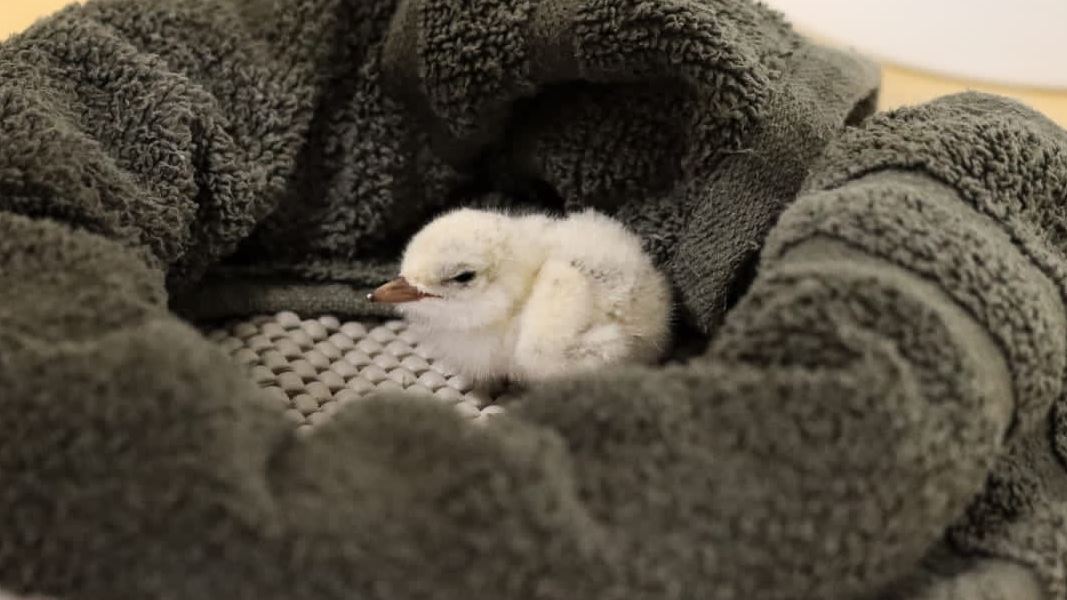Archived content: This media release was accurate on the date of publication.
Date: 04 May 2023
Due to the recent weather conditions, only three wild tara iti / NZ fairy tern chicks have fledged, two of which were lost in the cyclone. A further seven chicks were released from the captive rearing trial undertaken in partnership with Auckland Zoo.
During the season there were ten breeding females active at tara iti breeding sites, with two of these females breeding for the first time this season. From these females, a total of five chicks hatched in the wild, but only one chick survived through the cyclone and has been seen with the post-breeding flock.
A further eight chicks were hatched at Auckland Zoo, then transferred to a captive facility. Of these, seven were subsequently released on an island in the Kaipara Harbour. Rangers and volunteers are still undertaking post-release monitoring of the site.
“There were big lessons learned in the captive -rearing trials which we undertake in partnership with Auckland Zoo. While there is still more work to do, positive progress is being made.
"Many of the eggs intentionally collected for the captive -rearing trials this season likely would have been lost during the storms and extreme weather events, highlighting the future potential of intensive management like captive- rearing.
"Unlike other managed species in Aotearoa, it is not currently feasible to transfer them to predator-free offshore islands as they require very specific ecosystems to nest and thrive.
“Although this season has been challenging, we are encouraged by the progress we have made in predator control, habitat creation, nest management and captive-rearing and release. These efforts will be critical in the ongoing conservation of the tara iti,” said Alex Wilson, Tara Iti Senior Ranger.
With fewer than 40 birds, the tara iti is listed as nationally critical and has teetered on the brink of extinction since the 1970s.
Tara iti nest on shell and sand banks just above the high tide mark. This makes them vulnerable to rats, stoats and other predators, disturbance by people, 4WD vehicles and dogs. They are also at risk from stormy weather and very high tides.
A dedicated team of tara iti DOC rangers and volunteers have been busy year-round trapping predators near nesting sites, developing safe shell patches for nesting, and preventing nesting birds from being disturbed by humans.
DOC, alongside iwi and key stakeholders, has been developing a new recovery strategy for tara iti over the past few years. This plan includes management of the vegetation, sand, and shell at site to improve the quality of tara iti habitats and identifying and managing new sites for the birds.
This is combined with ongoing predator control, artificial incubation of eggs, and seasonal monitoring by DOC rangers and volunteers. The plan is informed by ongoing research into tara iti fertility, genetics, feeding, and improvements to data and field-based best practices.
Once widespread around the North Island and on the eastern South Island, tara iti now breed at only five main nesting sites; Papakānui Spit, Pākiri Beach, Waipū and Mangawhai sandspits and Te Ārai Stream mouth.
DOC works closely with Patuharakeke, Ngāti Wai, Ngāti Whātua o Kaipara, Ngāti Manuhiri, iwi and landowners at Pākiri and Te Uri O Hau, Auckland Zoo, The Shorebirds Trust, The NZ Fairy Tern Charitable Trust, About Tern, Birds NZ, Tara Iti Golf Club and the Waipū Trapping Group to help protect tara iti.
Support for the tara iti season has also been provided by the New Zealand Defence Force, Pākiri Beach Holiday Park, Tara Iti Golf Course, Auckland Council, Manāki, Mangakura Giant Kōkopu Hatchery, Tongariro National Trout Centre and New Zealand King Salmon.
To help tara iti and other shorebirds:
- Stay out of fenced areas and use designated walkways.
- Avoid shorebird nests and chicks.
- Keep dogs on leads.
- Remove bait, fish and rubbish to deter predators.
- Avoid driving on the beach.
- If you are being chased, squawked at, or if a bird is on the ground pretending to be injured, you are too close to a nest.
- If you find a nest do not touch it. The parent birds will be close by.
Contact
For media enquiries contact:
Email: media@doc.govt.nz
